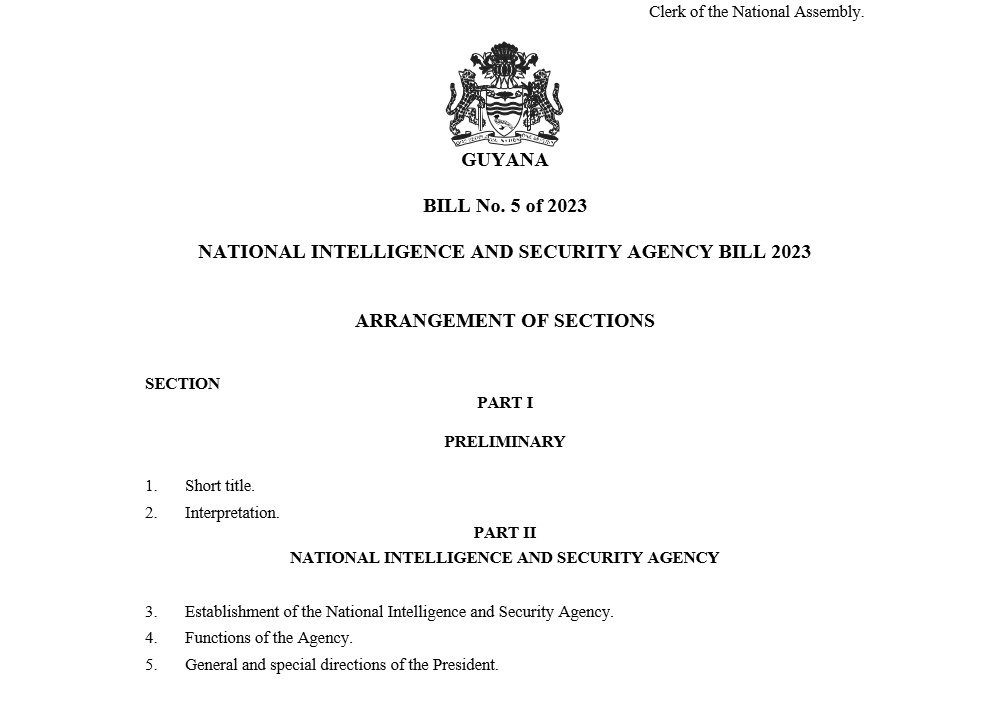The government is moving to create a national intelligence agency whose Director will be appointed by the President and will have an official standing not less than that of a Chief of Staff of the GDF or a Commissioner of Police and who shall be the principal adviser to the President on matters pertaining to the Act when passed.
Sources say a retiring officer of the Guyana Defence Force (GDF) is likely to be appointed to this post once the Act is assented to.
The National Intelligence and Security Agency Bill is to be tabled in the National Assembly tomorrow.
Under Clause 6, the appointment of the Head of this body is in the sole purview of the President. Such an arrangement is likely to give rise immediately to concerns.
According to the Explanatory Memorandum of the bill, the functions of the Agency are set out in Clause 4 and these include gathering information on national intelligence and security that will provide a basis for decision making and preventive action and conducting analysis of the information, providing intelligence and security advice to the President, Cabinet and, on the President’s direction where necessary, Ministers and entities in the security sector and other national stakeholders.
Clause 5 provides for the President to give “general and special directions” to the Agency. It also provides that the President may, after consultation with the Minister or any other person the President considers appropriate, “give directions to the Director of a general or specific character regarding policy to be followed by the Agency and the Director shall give effect to those directions”.
According to Clause 6, the Director shall have the authority, direction and control over the Agency subject only to the President. The Director’s official standing shall be equivalent to a position not less than a Chief of Staff or Commissioner of Police. The Director shall, subject to the requirement of legal advice, be the Principal adviser to the President on matters relating to the provisions of this Act.
The qualifications of the Director and Deputy Director shall be a minimum of a first degree (or of an equivalent level) from a recognised university in the field or related field of intelligence, counter intelligence, security and defence or strategic studies.
Clause 20 says that the Director shall have full operational powers including the power to organise, approve and supervise all activities and direct analytical and technical cooperation and external operations.
Powers
Under Clause 21, officers of the Agency in the discharge of their functions will have powers of police and officers of the defence force.
The Agency under Clause 22 will have the power to provide for the use of undercover intelligence support for its operations.
In the discharge of its functions the Agency under Clause 23 shall have the power to intercept communications within the meaning of and in the manner provided in the Inter-ception of Communica-tions Act, Cap. 47:03.
Clause 24 provides for the provision of information by public bodies to the Agency on request by the Director notwithstanding the Access to information Act 2011 or any other law.
Clause 25 provides that for the purposes of the Access to Information Act 2011 the Agency shall not be regarded as a public authority.
Clause 26 provides for the Agency to be kept apprised by entities in the security sector with all “relevant and timely information and intelligence relating to national security interest”.
Clause 27 caters for other entities in the security sector whose mandates require the conduct of intelligence gathering operations to consult with the Agency for the purpose of coordinating the intelligence programmes and operations of those entities.
The Director may employ such number of officers and employees for the Agency as are necessary for the discharge of the functions of the Agen-cy, Clause 13 says. The Agency may include officers in active duty duly transferred or seconded for duty with the Agency from entities in the security sector. “Officers and other employees shall be persons of integrity and confidentiality who shall be remunerated as determined by the Director in consultation with the President or a person designated by the President”, clause said.
Clause 15 addresses the obligation to secrecy. “Every person having a duty in the administration of this Act shall regard and deal with as secret and confidential all information relating to the functions of the Agency, and if at any time such person communicated or attempted to communicate any such information to any person other than in pursuance of, for instance, the discharge of a function under this Act, a Court order or the investigation of a crime, the person commits an offence and is liable on conviction on indictment to a fine of five million dollars and to imprisonment for five years”, the clause stated.
Clause 16 provides for the oath of office and secrecy to be taken and subscribed by anyone before taking up duties in the Agency.
The Agency under Clause 17 shall be funded by a direct charge on the Consolidated Fund.
Clause 30 caters for intelligence support to law enforcement agencies, other entities in the security sector or other national stakeholders in the prevention or detection of crime. Request for such shall be made to the Director in writing. In a justifiable case, the Director shall approve of the request and provide the support.
Clause 31 would enable the Agency to make use of its operational tools and methods in order to provide protection for institutions and facilities of Guyana but the Agency shall not provide physical protection for such.
Under Clause 32, the Director with the approval of the President may assign officers of the Agency to serve as liaison officers to embassies abroad, when necessary for the fulfilment of the responsibilities of the Agency pursuant to this Act.
Clause 38 establishes an Intelligence and Security Committee which shall comprise of three members appointed by the President. The members shall be one person nominated by the President, one person nominated by the leader of the main opposition party in the National Assembly after consultation with the other opposition parties in the National Assembly and one person nominated by organisations representing civil society.
The Committee shall review matters referred to it and express its opinion on any question and make recommendations to the President.








